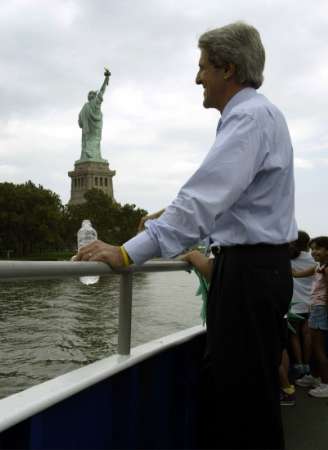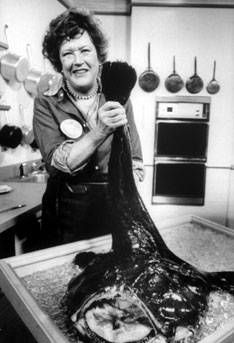Hi folks, well I suppose there’s some degree of irony that I’m hanging out at Casa Ed when I’m not even blogging at my own site for the rest of the week, but when your mind dovetails into mindless parody, one has to find an outlet for it somewhere. Besides, now I can fulfill my true calling as the Court Jester of the Superfriends Kingdom.
And so, I present….
CHASING DUBYA
From Kevin Smith, acclaimed writer-director of Clerks, Dogma and Jersey Girl and the most original filmmaker of his generation, his most audacious movie yet, adapted from a novel by Nicholson Baker.
Meet Jay.
Meet Silent Bob.
Jay summons his old friend Silent Bob to a motel room not far from the bowels of New Jersey. During the course of an afternoon, they share a pizza, smoke copious amounts of marijuana and plow through several six-packs of beer from the room’s fridge. They chat about everything from Silent Bob’s success on Atkins to comic books to the unfortunate fate of their attempts to score with women.
And Jay explains to Silent Bob exactly why and how he is planning to commit a murder that will change the course of history.
[Interior: seedy motel room, equipped only with a television, fridge, bad artwork on the lefthand wall, two single beds, and a table. JAY and SILENT BOB sit at the table, directly across from each other, both facing the TV.]
JAY: Guess what?
SILENT BOB: [shrugs]
JAY: I have the best fucking idea ever. You know what I’m going to do? I am so fucking excited about this, it is not even funny! It’s so unbelievably best! Buzz!
SILENT BOB: [tilts head upwards]
JAY: You’re gonna shit yourself when I tell you, just completely fucking get wasted. Because it is the best fucking thing I have ever thought of.
SILENT BOB: [jerks head insistently, as if to say, “get to the fucking point”]
JAY: I’m gonna kill the President! YEAH!!!
SILENT BOB: [says nothing]
JAY: I know, isn’t that fucking awesome! I’m going to take out that motherfucking cocksucker of a president. He’s the worst! He’s gotta go! Fuck yeah!
SILENT BOB: [says nothing]
JAY: I’m sick and tired of working in a fucking convenience store all day, reading the same fucking comic books and seeing the same fucking people—sorry man, I don’t mean you, just every other motherfucking asshole—I gotta do something different. Something that will make me eternally cool in this fucking wasteland. And the prez—he’s a total abortion, man, how can you stand it? With his weird lookin’ eyes and his funny voice and that whole Darth Vader shit going on. Doesn’t it make you fucking MAD?
SILENT BOB: [folds arms, tries to cover up the fact that he’s rolling his eyes every six seconds]
JAY: I mean look! LOOK! [leans over to the right and pulls out a stash of leaflets. He puts them on the table.] I spent fuckin’ hours working on these babies, getting them just right.
SILENT BOB: [picks up a leaflet and starts reading. His face darkens. He puts the leaflet back down on the table, then stares directly at Jay and sneers.]
JAY: I never should have invited you here, assclown. You’d never get it. Besides you didn’t read that long enough. I bet you didn’t even get to the part where I talk about why the president has fucked up the country—and more importantly, my fucking life–in seventeen different ways. What kind of fucking friend are you that you can’t listen to me when I need you to help me out most?
SILENT BOB: [says nothing]
JAY: What do you mean, why? You know why! Read the fucking leaflet!
SILENT BOB: [says nothing]
JAY: [picks up the leaflet and starts reading.] Oh. Fuck. I didn’t mean to say that. Fuck.
SILENT BOB: [looks at Jay, then looks at the fridge]
JAY: Huh?
SILENT BOB: [widens eyes at Jay, then points to the fridge]
JAY: Oh. You wanna beer? [opens the fridge, removes two beers and sets them on the table. SILENT BOB takes one, JAY takes the other.]
JAY: So like I was saying—
SILENT BOB: [glares, then rolls his eyes.]
JAY: Oh. Yeah, I guess I see what you mean. It does sound kinda fucking stupid, doesn’t it?
SILENT BOB: [nods]
JAY: Well, OK. You bring any weed?
SILENT BOB: [nods]
JAY: Yeah, gimme some.
[SILENT BOB pulls several joints out from his pocket, gives one to JAY. Both light up and take deep drags. Both exhale at the same time.]
JAY: This is the best fucking weed I’ve ever had. Swear to GOD! So, what was I saying again?
SILENT BOB: [shrugs. He gets up and turns the TV on. A bunch of girls in bikinis and wet t-shirts appear on the screen]
JAY: Yeaaaaaaaaahhhhhhh…..
[END OF SCENE]


 Appearance by Choire Sicha?
Appearance by Choire Sicha?  The WTF? Assignment:
The WTF? Assignment: 

